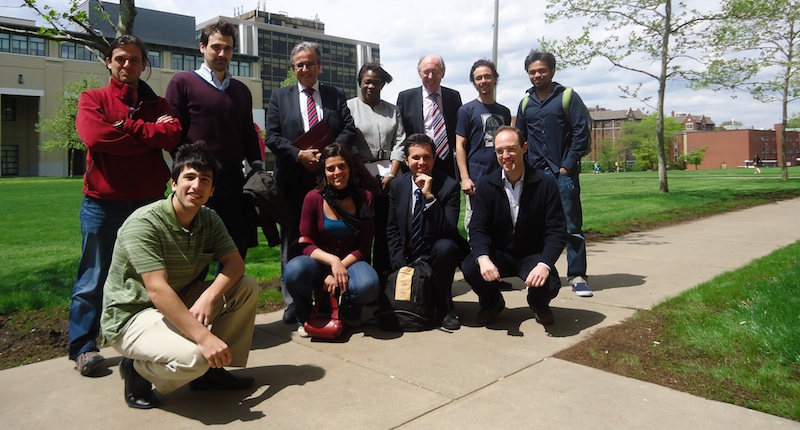Portuguese Professors Receive Highest Faculty Distinction at Carnegie Mellon
 |
 |
Irene Fonseca and Manuela Veloso, internationally respected educators and researchers in their fields of study, recently received the title of University Professor, the highest distinction awarded at Carnegie Mellon University (CMU). Along with Irene Fonseca and Manuela Veloso, Mark Kamlet (CMU Provost and Executive Vice President), Sheldon Cohen (Robert E. Doherty Professor of Psychology), and Jim Daniels (Thomas Stockham Baker Professor of English), were also named to the 2014 Class of University Professors. |
The Mellon College of Science Professor of Mathematics, Irene Fonseca has been since 1987 at CMU, where she leads the Center for Nonlinear Analysis, a center devoted to research and training in Applied Mathematics at the intersection of Mathematics and the Physical Sciences and Engineering. She is also the director of the Partnerships for International Research and Education project, a National Science Foundation-funded multi-institution grant that addresses issues in Applied Mathematics and Mechanics that arise from Materials Science. Irene Fonseca leads the Applied Mathematics Dual Degree Doctoral Program in the CMU Portugal Program. Irene Fonseca’s research lies at the interface of Applied Analysis with Materials and Imaging Sciences. (Irene Fonseca’s statement)
The Herbert A. Simon Professor of Computer Science Manuela Veloso joined CMU in 1992, after earning her Ph.D. in Computer Science also at CMU. Manuela Veloso is internationally recognized for her pioneering work on robot soccer, an important research tool for studying how autonomous agents can work cooperatively in complex, uncertain environments. Since 1997, the robot teams fielded by her and her students have perennially been strong competitors in the championships of the International RoboCup Federation, of which she is a past president. She is the founder and head of the CORAL research group that investigates autonomous robots and software agents that Collaborate, Observe, Reason, Act and Learn to perform planning, execution and learning tasks.
Manuela Veloso’s has been involved in the CMU Portugal Program co-leading research projects and co-advising dual degree doctoral students. Recently, Manuela Veloso and Francisco Melo, from INESC ID, were awarded a research grant for an Entrepreneurial Research Initiative (ERI) titled “INSIDE: Intelligent Networked robot Systems for Symbiotic Interaction with Children with Impaired Development.”
The title of University Professor is typically awarded to professors who represent the intellectual leadership of CMU through their expertise and accomplishments in their respective fields of study.
June 2014
_________
Irene Fonseca will be in Portugal for the Workshop “Trends in Non-Linear Analysis 2014,” which will take place between July 31 and August 1, 2014, at Instituto Superior Técnico of the Universidade de Lisboa (IST-UL).
















